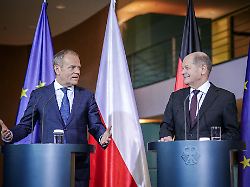Crimes in the Second World War
Poland wants to clarify disputed reparations with Berlin
February 12, 2024, 10:11 p.m
Listen to article
This audio version was artificially generated. More info | Send feedback
The former Polish PiS government is demanding 1.3 trillion euros from the federal government as reparations for damage caused by the Second World War. However, Germany rejects this. Now the new head of government, Tusk, wants to look for solutions together with Chancellor Scholz.
Poland’s new government wants to start talks with Germany about dealing with compensation for the damage suffered in World War II. In a formal and legal sense, the question of reparations has been closed for many years, said Prime Minister Donald Tusk in Berlin after his meeting with Chancellor Olaf Scholz. “The issue of moral, financial and material reparation was never implemented.”
Tusk emphasized that, in contrast to his predecessors from the national-conservative PiS government, he and Chancellor Scholz wanted to “look for forms of cooperation that would not be a downfall for our relations in the future.” It’s not about building a front of mutual resentment. Rather, this is an idea for further cooperation that serves security and could be beneficial for both nations. The national-conservative PiS government, which has now been voted out and was in office from 2015 until mid-December 2023, demanded more than 1.3 trillion euros from the federal government in October 2022 as compensation for the damage caused by the World War.
The PiS government argued at the time that after the end of the Second World War, Western countries such as France and the Netherlands were treated better than Poland. In the Potsdam Agreement of 1945, the four victorious powers agreed that the Soviet Union would be compensated from the Soviet occupation zone in eastern Germany and that Poland would receive a share.
By 1953, it is estimated that around 3,000 companies were dismantled and additional goods from ongoing production were transported away. However, Warsaw points out that Poland had to compensate for its share by delivering coal to the Soviet Union. The federal government, in turn, considers the reparations issue to be closed and cites the Two-Plus-Four Treaty on the foreign policy consequences of German unification, in which Poland, however, was not involved.
